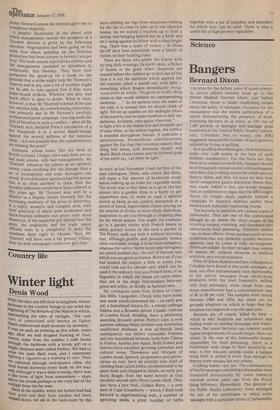Country life
Winter light
Denis Wood While the days are still slow to lengthen, winter &rkn. ess in the country brings to my mind the • ginning of The Return of the Native in which, aPProaching the time of twilight, "the vast tract
of unenclosed wild known as Egdon _Heath embrowned itself moment by moment." it was on such an evening as this when, years ago, after we had stopped hunting at four,
entY Miles from the stables, I rode home "trough the darkness with a lovely girl on a bright chestnut mare called Perfect. We had to cross the main Bath road, and I remember lighting a cigarette as a warning to cars. Then We cantered through well-known rides, the tired horses knowing every bush on the way and, although it was \ a dark evening, there was a dim loom of light from somewhere — stars above the clouds perhaps or the very last of the tWilight from the far west. Back at the stables, when the horses had had their gruel and their bran mashes and been wisPed down, we sat in the tack-room by the
stove shifting our legs from weariness waiting for the car to come to take us to our separate homes. As we waited I reached up to hold a stirrup iron hanging behind me,on a hook and let it swing against its fellow with a clear bright ring. There was a scent of violets — in those far-off days men sometimes wore a bunch of violets on their hunting coats.
There are those who prefer the winter with its long dark evenings, its starlit skies, a flicker of flames in the grate when chestnuts are roasted before the children go to bed, but all the time it is not the darkness which appeals but the contrast, albeit a muted one, with light — something which Ruskin immediately recognised when he wrote, "No good or lovely thing exists in this world without its corresponding darkness . . ." At the darkest time, the nadir of the year, it is natural that we should think of light. We set up candles on the midnight altars of the nativity and we make bonfires to defy the darkness. As Hardy, once again, observed, ". . to light a fire is the instinctive and resistant act of man when, at the winter ingress, the curfew is sounded throughout Nature. It indicates a spontaneous, Promethean rebelliousness against the fiat that this recurrent season shall bring foul times, cold darkness, misery and death. Black chaos comes, and the fettered gods of the earth say, Let there be light."
As early as last November I had the first of the seed catalogues. These, and others like them, will repay a fair amount of backroom study before making up an order for vegetable seeds. The worst way to buy these is to go at the last minute into a garden shop in a hurry to get somewhere else, to write or read a spiteful review as likely as not, jostled, distracted, in a crowd of bored, improvident others relying on the descent of divine, or more likely diabolical, inspiration to see you through a cropping plan for the whole season. You might, for example, go to a garden centre with French beans in mind, quickly notice on the rack a packet of The Prince, walk out with it without knowing that, although prolific and reasonably tender when extremely young, it is far from stringless, whereas the variety Sprite is not only stringles& but pencil-podded also, the sort of haricot vert which you are given in France. Moreover, if you had studied the subject a little at home, you would look out for chevier vert, which can be used in the ordinary way as a French bean, or as flageolets in which the beans are eaten when they are at the stage intermediate between green and white, or thirdly as haricots secs. My catalogues came from Dobies of Upper Dee Mills, Llangollen, Clwyd, who have some new seeds which interested me — an early pea Jof, a butterhead lettuce ho, a winter cabbage Hidena and a Brussels sprout Citadel. Suttons of London Road, Reading, have a promising sounding Brussels sprout Perfect Line, a new summer cabbage Hispi, another new Australian cauliflower Brisbane, a new all-female (and consequently not bitter) cucumber Femdan and two butterhead lettuces, both from Clause in France, Aurelia and Appia. Both Dobies and Suttons have excellent growing calendars and cultural notes. Thompson and Morgan of London Road, Ipswich, progressive and adventurous as ever, have an entirely new kind of climbing bean called Zebra, recommended to be eaten fresh and chopped in salads, an early pea Hurst Beagle, from the same kennel as that excellent second early Hurst Green Shaft. They also have a new fruit, Golden Berry — a new kind of Cape Gooseberry — which I shall look forward to experimenting with, a number of sprouting seeds, a great number of herbs together with a list of maladies and disorders for which they can be used, There is also a useful list of high protein vegetables.


























 Previous page
Previous page